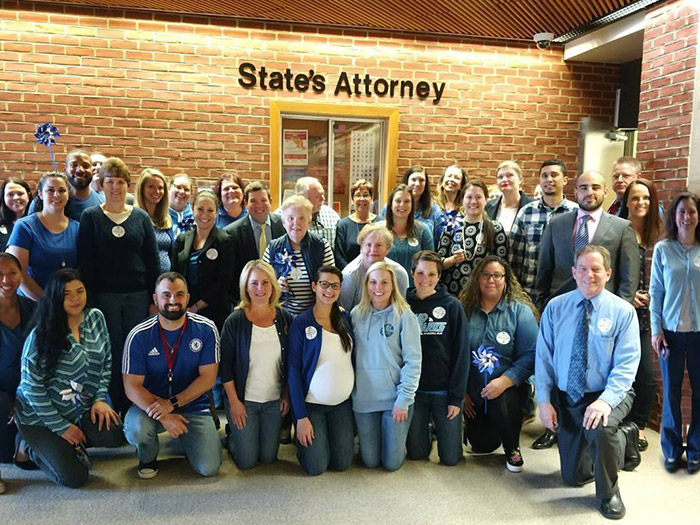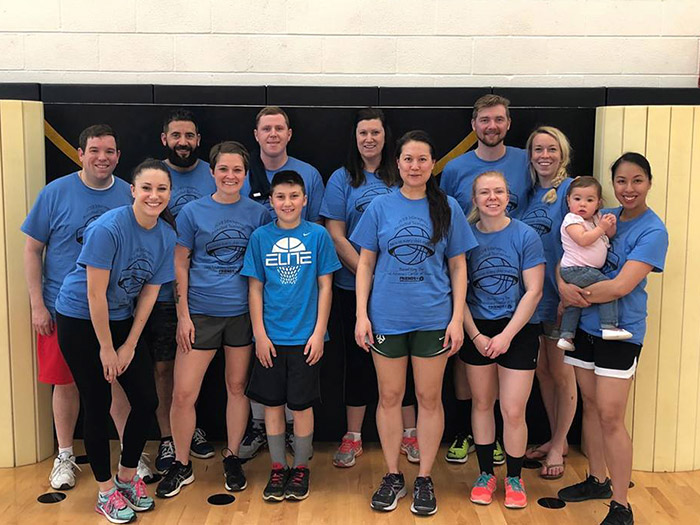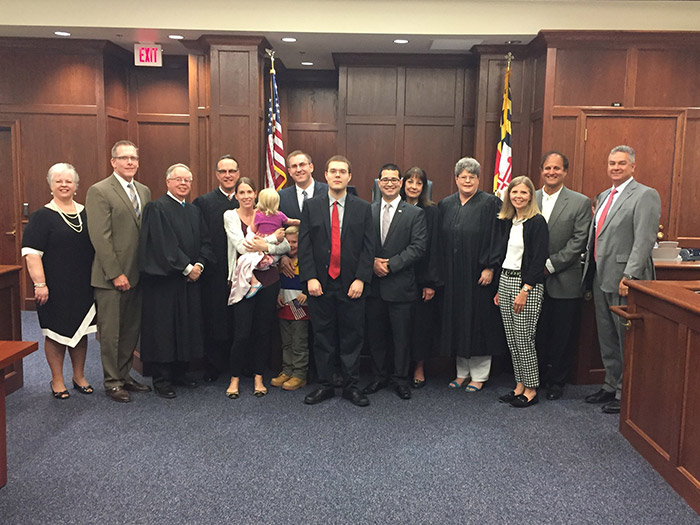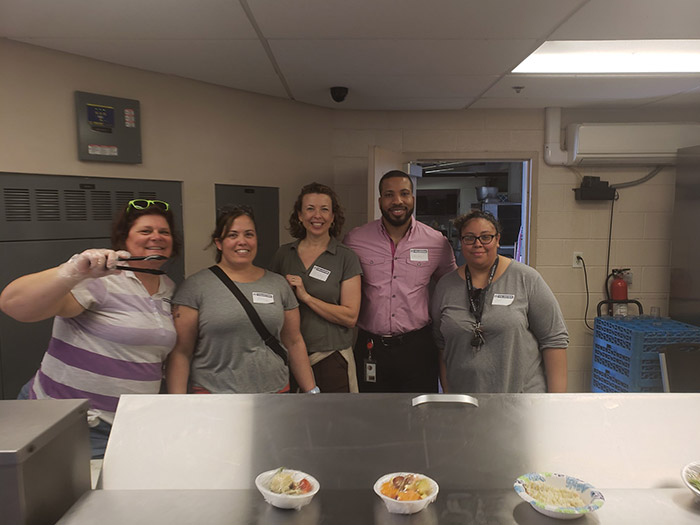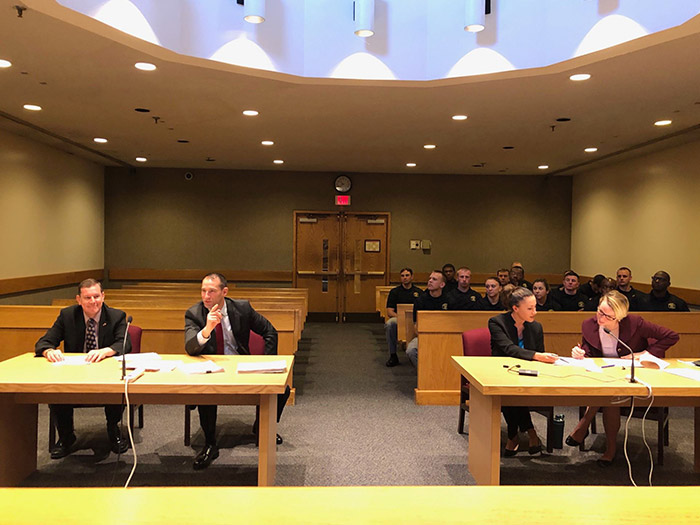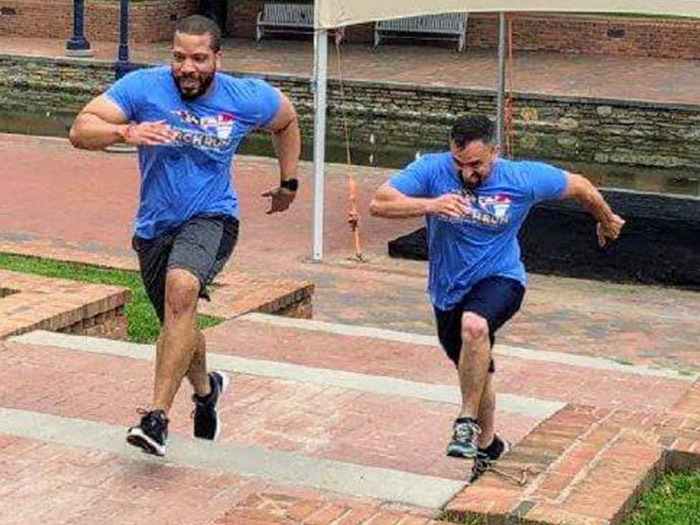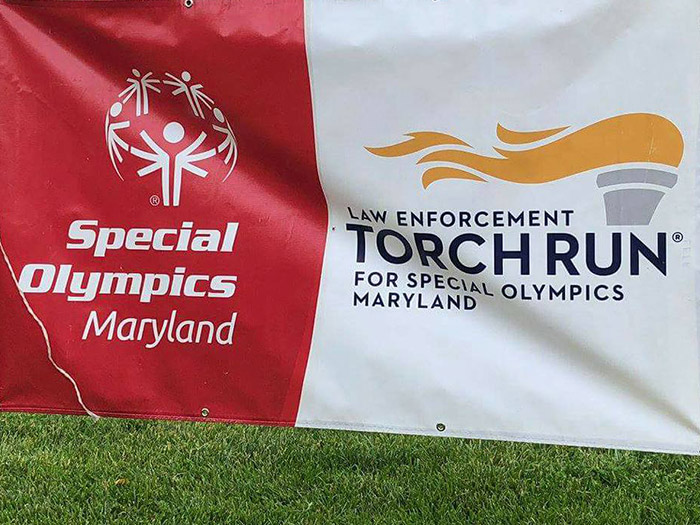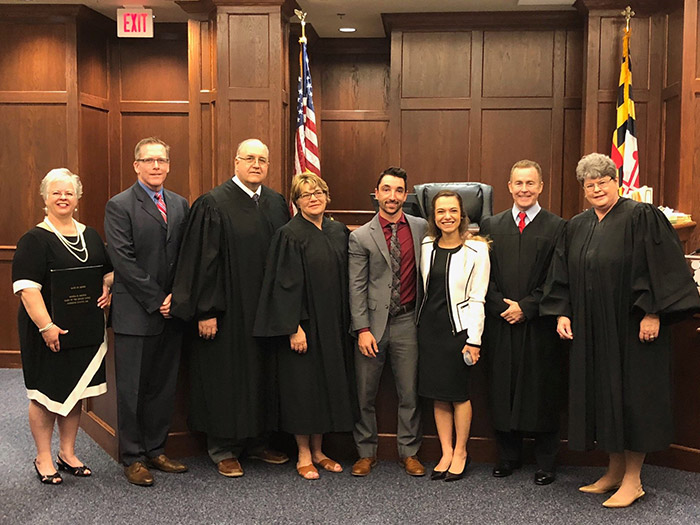Introduction
The Youthful Offender Program (YOP) was created by the Frederick County State’s Attorney’s Office to serve the community as a dynamic juvenile diversion program. Since 1997, this innovative approach has served as a vital alternative for the juvenile justice system in Frederick County. The punitive and educational components continue to be developed and enhanced to meet the challenging demands of this unique population. The cooperative efforts of various agencies, organizations, and volunteers ensure the success of this endeavor.
Since its inception, over 2,200 youth have been served by YOP. The success of this initiative is indicated by the low 35% recidivism rate among participants. Beyond being recognized by the Governor’s Office, County Commissioners, and Attorney General’s Office, the true value of this program can be found in the many lives it has changed for the better.
PROGRAM SUMMARY
Each juvenile is required to participate in an intensive three-week program that includes:
- Classroom instruction at the Frederick County Public Safety Training Center. Guest speakers from the community are invited to talk with the participants.
- Counseling
- Drug and alcohol assessments
- A strict curfew from 7 p.m. to 6 a.m.
- Site visits to locations such as R. Adams Cowley Shock Trauma Center, Frederick County Adult Detention Center, and the Western MD Juvenile Detention Center
- Written reports on all site visits and a final report about the juvenile’s overall experience with the program
- 7 hours of community service
Program
The Frederick County Drug Treatment Court (DTC) is a voluntary, non-adversarial judicial response to non-violent, drug addicted offenders charged in Circuit Court. The DTC is a post-plea, pre-sentence program. In order to enter the DTC, the defendant must plead guilty and sentencing is deferred. The defendant must participate fully with all prescribed treatment and instructions of the DTC staff. Sentencing will occur upon graduation or termination from DTC. The DTC provides a comprehensive program of supervision and treatment, which includes substance abuse treatment, education, and vocational and rehabilitative services. Focus The DTC focuses on assisting the participants in achieving self-sufficiency and becoming responsible members of the community by living drug-free in an environment filled with life’s obstacles and pressures. Who is Eligible Many of these residents will be unemployed, indigent, single parents who have educational, job training, housing, and social issues. The eligibility requirements are blind to race, ethnicity, gender, and/or religious orientation. The following goals have been developed to provide a more efficient judicial process for criminal cases involving substances, to provide a more effective intervention for alcohol and substance abuse offenders, and to decrease recidivism within the community:
Goal #1:
Enhance public safety in Frederick County by reducing criminal activity (to include any drug and/or alcohol-related citation/charges) by DTC participant and graduates within the community.
Goal #2:
Reduce substance abuse among DTC participants by providing effective interventions.
Goal #3:
To reduce the burden on taxpayers by promoting self-sufficiency of participants and graduates.
Drug Treatment Court Agency Partners Frederick County Circuit Court Frederick County State’s Attorney’s Office Office of the Public Defender Frederick County Behavioral Health Services – Substance Abuse Services Department of Public Safety & Correctional Services – Community Supervision Frederick County Law Enforcement Agencies For information regarding the Frederick County Drug Treatment Court program, contact DTC Coordinator Paul Wolford at 301-600-2978 or via email Paul Wolford.
Program
The Frederick County Drug Treatment Court (DTC) is a voluntary, non-adversarial judicial response to non-violent, drug addicted offenders charged in Circuit Court. The DTC is a post-plea, pre-sentence program. In order to enter the DTC, the defendant must plead guilty and sentencing is deferred. The defendant must participate fully with all prescribed treatment and instructions of the DTC staff. Sentencing will occur upon graduation or termination from DTC. The DTC provides a comprehensive program of supervision and treatment, which includes substance abuse treatment, education, and vocational and rehabilitative services. Focus The DTC focuses on assisting the participants in achieving self-sufficiency and becoming responsible members of the community by living drug-free in an environment filled with life’s obstacles and pressures. Who is Eligible Many of these residents will be unemployed, indigent, single parents who have educational, job training, housing, and social issues. The eligibility requirements are blind to race, ethnicity, gender, and/or religious orientation. The following goals have been developed to provide a more efficient judicial process for criminal cases involving substances, to provide a more effective intervention for alcohol and substance abuse offenders, and to decrease recidivism within the community:
Goal #1:
Enhance public safety in Frederick County by reducing criminal activity (to include any drug and/or alcohol-related citation/charges) by DTC participant and graduates within the community.
Goal #2:
Reduce substance abuse among DTC participants by providing effective interventions.
Goal #3:
To reduce the burden on taxpayers by promoting self-sufficiency of participants and graduates.
Drug Treatment Court Agency Partners Frederick County Circuit Court Frederick County State’s Attorney’s Office Office of the Public Defender Frederick County Behavioral Health Services – Substance Abuse Services Department of Public Safety & Correctional Services – Community Supervision Frederick County Law Enforcement Agencies For information regarding the Frederick County Drug Treatment Court program, contact DTC Coordinator Paul Wolford at 301-600-2978 or via email Paul Wolford.
Program
The Frederick County Drug Treatment Court (DTC) is a voluntary, non-adversarial judicial response to non-violent, drug addicted offenders charged in Circuit Court. The DTC is a post-plea, pre-sentence program. In order to enter the DTC, the defendant must plead guilty and sentencing is deferred. The defendant must participate fully with all prescribed treatment and instructions of the DTC staff. Sentencing will occur upon graduation or termination from DTC. The DTC provides a comprehensive program of supervision and treatment, which includes substance abuse treatment, education, and vocational and rehabilitative services. Focus The DTC focuses on assisting the participants in achieving self-sufficiency and becoming responsible members of the community by living drug-free in an environment filled with life’s obstacles and pressures. Who is Eligible Many of these residents will be unemployed, indigent, single parents who have educational, job training, housing, and social issues. The eligibility requirements are blind to race, ethnicity, gender, and/or religious orientation. The following goals have been developed to provide a more efficient judicial process for criminal cases involving substances, to provide a more effective intervention for alcohol and substance abuse offenders, and to decrease recidivism within the community:
Goal #1:
Enhance public safety in Frederick County by reducing criminal activity (to include any drug and/or alcohol-related citation/charges) by DTC participant and graduates within the community.
Goal #2:
Reduce substance abuse among DTC participants by providing effective interventions.
Goal #3:
To reduce the burden on taxpayers by promoting self-sufficiency of participants and graduates.
Drug Treatment Court Agency Partners Frederick County Circuit Court Frederick County State’s Attorney’s Office Office of the Public Defender Frederick County Behavioral Health Services – Substance Abuse Services Department of Public Safety & Correctional Services – Community Supervision Frederick County Law Enforcement Agencies For information regarding the Frederick County Drug Treatment Court program, contact DTC Coordinator Paul Wolford at 301-600-2978 or via email Paul Wolford.
Program
The Frederick County Drug Treatment Court (DTC) is a voluntary, non-adversarial judicial response to non-violent, drug addicted offenders charged in Circuit Court. The DTC is a post-plea, pre-sentence program. In order to enter the DTC, the defendant must plead guilty and sentencing is deferred. The defendant must participate fully with all prescribed treatment and instructions of the DTC staff. Sentencing will occur upon graduation or termination from DTC. The DTC provides a comprehensive program of supervision and treatment, which includes substance abuse treatment, education, and vocational and rehabilitative services. Focus The DTC focuses on assisting the participants in achieving self-sufficiency and becoming responsible members of the community by living drug-free in an environment filled with life’s obstacles and pressures. Who is Eligible Many of these residents will be unemployed, indigent, single parents who have educational, job training, housing, and social issues. The eligibility requirements are blind to race, ethnicity, gender, and/or religious orientation. The following goals have been developed to provide a more efficient judicial process for criminal cases involving substances, to provide a more effective intervention for alcohol and substance abuse offenders, and to decrease recidivism within the community:
Goal #1:
Enhance public safety in Frederick County by reducing criminal activity (to include any drug and/or alcohol-related citation/charges) by DTC participant and graduates within the community.
Goal #2:
Reduce substance abuse among DTC participants by providing effective interventions.
Goal #3:
To reduce the burden on taxpayers by promoting self-sufficiency of participants and graduates.
Drug Treatment Court Agency Partners Frederick County Circuit Court Frederick County State’s Attorney’s Office Office of the Public Defender Frederick County Behavioral Health Services – Substance Abuse Services Department of Public Safety & Correctional Services – Community Supervision Frederick County Law Enforcement Agencies For information regarding the Frederick County Drug Treatment Court program, contact DTC Coordinator Paul Wolford at 301-600-2978 or via email Paul Wolford.
Frederick County State‘s Attorney’s Office Intern And Clerkship Program
The Intern Clerkship Program provides college and law school students with invaluable legal experience in Frederick County. This program has been implemented to allow a student in the Criminal Justice field to observe and participate in all facets of a Criminal Investigation and due process through the Criminal Court System. It is the intention of the State’s Attorney’s Office and the prosecutor assigned to the intern to offer the intern a hands-on experience which will enhance their traditional course of study at their university.
We offer many rewarding and exciting opportunities litigating the following types of cases:
- Felony Trial
- Sex Crimes Unit
- Domestic Violence
- Special Prosecutions
- Juvenile Division
- Narcotics Bureau
The Intern and Clerkship Program is designed for students only. Internships and Clerkships are offered in the summer and during the academic year. We accept applications year-round and interview candidates on a rolling basis. Undergraduate students with relevant experience or education are welcome to apply.
Each Division has a limited number of placements for non-salaried interns. Interns have the unique opportunity to receive two hands-on experiences in the preparation of the prosecution of criminal cases in either our District Court Division or our Circuit Court Division. The intern will be assigned to a full time Assistant District Attorney and/or Division Chief who will supervise the intern. Although the intern will generally be assigned to a primary prosecutor, from time to time he or she will be assigned to others within the State’s Attorney’s Office to include other prosecutors, detectives, and for at least one day, personnel from the victim/witness advocacy unit. The primary prosecutor will complete a work performance evaluation at the conclusion of the program. A copy of that evaluation will be provided to the student’s university’s practicum coordinator.
Undergraduate Internships:
The Undergraduate Internship Program is designed to give undergraduate students exposure to the prosecutor’s role in the criminal justice system and for the Office to scout perspective employees. At the Frederick County State’s Attorney’s Office, interns are an integral part of our workforce. Students gain exposure to criminal case prosecution and are given responsibility, meaningful work, and a chance to leave their mark.
The internship program also affords students the opportunity to get “real world” experience in their area of study, possibly for college credit. The program is intended to provide knowledge, skills, and experiences that an intern can apply to future challenges and professional pursuits, while giving back to the Frederick community.
Most students are assigned to one unit for the duration of the internship as determined by the current needs of the Office. Occasionally these needs may require a student to split time between units. Each student will have unique experiences and duties based upon unit assignment. Some students will closely assist paralegals and/or Assistant State’s Attorneys, while others will work more independently fulfilling unit tasks. Regardless of unit placement, all students will be given the opportunity to observe the various aspects of criminal case prosecution. To further enhance the experience, State’s Attorney’s Office personnel will lead breakout sessions highlighting units and office initiatives during each semester.
Students are required to give the office a minimum of 15 hours per week during the spring and fall semesters. If a student is performing the internship for academic credit, it is the student’s responsibility to communicate the institutional requirements to the Office. All undergraduate internship positions are unpaid.
Program Details:
Depending on the assignment, students may assist in investigations, hearings and trials; prepare, compile and analyze legal and non-legal documents and financial data; perform research, observe witness interviews, participate in community outreach programs and attend trials.
As a Victim/Witness Coordinator, the undergraduate college student acts as a liaison between victims and State’s witnesses, and the prosecuting attorney. The intern is assigned a particular day in court, and each week is responsible for pulling the files in preparation for that court day. The intern also contacts the State’s victims and witnesses regarding their court appearance and answers any questions they may have.
Interns also play a critical role in preparing (screening) and assisting Assistant State’s Attorneys in the District Court with misdemeanor criminal cases. The intern is a bridge between the citizens and the legal system, to educate the community to better understand the workings of the criminal justice system, and assist citizens to more effectively utilize the legal system to achieve justice.
Other tasks include:
- Interviewing victims, witnesses, police officers
- Gathering and reviewing evidence
- Preparing subpoenas, motions, and other court documents
- Redaction on documents to be introduced in court
- Listening to jail calls
- Victim/Witness support (fielding v/w questions before and during court)
- Perform a variety of clerical tasks.
Summer Clerkship
The program is a unique and invaluable opportunity for law school and undergraduate intern students offered during the summer. It provides students with opportunities to receive expert training with a classroom component. With this experience, law clerks and summer interns are able to observe presentations on evidence-based training. In addition, both clerks and interns will hear first-hand accounts from prosecutors about their career track in a panel format.
The Clerkship is meant to be informative and helpful to students considering a career in criminal prosecution or law.
- Legal Research and Writing as it applies to cases assigned
- Trial Team Support (in the courtroom)
- Conferencing cases with the Assistant State assigned
- Obtaining and reviewing evidence for cases assigned
- Writing a factual narrative of the events
- Identifying and analyzing legal issues
- Researching applicable case law
- Making a recommendation to the Assistant State’s Attorney on how the case should progress
- Support Assistant State’s Attorney in the course of preparing for trial and accompany them to court.
- Organize and/or analyze various documents and discovery.
- Observe the various aspects of criminal case prosecution, including preliminary hearings, jury trials, bail hearings, arraignment hearings etc.
- Accompany prosecutors to interviews with victims and/or witnesses.
Program Details:
To expose law school and college students to various aspects of the criminal justice system and provide firsthand exposure to the work of the office, the summer clerkship program conducts a variety of informational programs and activities throughout the summer, including:
- Lecture Series: States Attorney discuss a specific case or topic.
- Mock Litigation: Students conduct a mock appellate argument; serve as a witness in the law student mock suppression hearings.
- Luncheon Round-Table: Discussion with the program attorney-in-charge about legal topics, current work projects, and other aspects of the criminal justice system, discuss specific cases and areas of expertise
- Community Relations: Shadow ASAs conducting Community Outreach Programs;
- Field Trips: Visit the Frederick County Adult Detention Center; Police Department’s Tactical Training Facility, Health Department; Drug Court; Ride Along Program; etc
- Teambuilders: Opportunities for interns to socialize with each other and members of the legal and support staff
Schedule
Orientation
- During the first week the intern will meet with his or her assigned Assistant State’s Attorney and be given a tour of the Courthouse and Detective’s center. The intern will meet with the State’s Attorney, Division Chiefs, victim/witness coordinators, and staff
- Job descriptions and current work assignments for each of the ASA
- How prosecutors receive work assignments
- How each case is opened and worked
- The elements of criminal prosecution, including:
- Police Criminal Complaint & Affidavit
- Arrest Warrant
- Preliminary Arraignment
- Preliminary Hearing
- Discovery Process
- Arraignment
- Plea agreement or trial
- Pre-sentencing Hearing
- Sentencing
Work Week
The intern will work with assigned prosecutor:
- Assist investigator in opening and preparing cases;
- interviewing victims, witnesses, law enforcement officers, detectives, and others in researching assigned cases;
- reading and analyzing various discovery material in preparation of case management, including: police incident reports, investigation reports, criminal and driver’s histories, medical reports, lab reports, certified criminal and conviction records, expert reports, and others;
- reviewing search warrants, private criminal complaints, and various felony criminal complaints;
- attending preliminary hearings and pre-trial motions;
- assist in negotiating plea agreements with attorneys;
- attend litigating hearings for arraignment, bail, parole, probation, and sentencing;
- observe court trials and conducting jury selection,
- preparing opening statements,
- doing legal research, writing briefs
- preparing legal briefs, correspondence and memoranda, subpoenas pleadings, motions and petitions.
- work with the Victim/Witness Coordinator with assisting crime victims, witnesses and significant others throughout the criminal justice process. They are responsible for insuring that victims and witnesses are treated with dignity, respect, and compassion, and provide the services required under the law.
Application Process
Summer Intern Program: We begin accepting applications for the Summer Program on February 1st and the deadline is April 1st (5:00pm EST).
Fall Semester (September – December): We begin accepting applications for internships on May 1st and the deadline is July 1st.
Spring Semester (January – May): We begin accepting applications for internships on November 1st and the deadline is January 1st.
Interviews are scheduled on a rolling basis and students are encouraged to submit applications well before the deadline.
Students invited to interview will be required to bring to the interview a one-page personal statement explaining your interest in public service, two letters of recommendation from professional or academic references, and an official college transcript.
A complete application consists of the following items:
- Application with signed release form
- Current Resume
- Legal Writing Sample of no more than eight pages
- One letter of recommendation. Letters of recommendation should be addressed to Vicky Schreiber, Community Coordinator, and sent to VSchreiber@statesattorney.us.
- An unofficial transcript
Undergraduate student applicants do not need to submit a legal writing sample and can alternatively submit a recent writing assignment of no more than five pages.
For Questions About Our Intern Program:
Contact vschreiber@statesattorney.us.
Frederick County State‘s Attorney’s Office Intern And Clerkship Program
The Intern Clerkship Program provides college and law school students with invaluable legal experience in Frederick County. This program has been implemented to allow a student in the Criminal Justice field to observe and participate in all facets of a Criminal Investigation and due process through the Criminal Court System. It is the intention of the State’s Attorney’s Office and the prosecutor assigned to the intern to offer the intern a hands-on experience which will enhance their traditional course of study at their university.
We offer many rewarding and exciting opportunities litigating the following types of cases:
- Felony Trial
- Sex Crimes Unit
- Domestic Violence
- Special Prosecutions
- Juvenile Division
- Narcotics Bureau
The Intern and Clerkship Program is designed for students only. Internships and Clerkships are offered in the summer and during the academic year. We accept applications year-round and interview candidates on a rolling basis. Undergraduate students with relevant experience or education are welcome to apply.
Each Division has a limited number of placements for non-salaried interns. Interns have the unique opportunity to receive two hands-on experiences in the preparation of the prosecution of criminal cases in either our District Court Division or our Circuit Court Division. The intern will be assigned to a full time Assistant District Attorney and/or Division Chief who will supervise the intern. Although the intern will generally be assigned to a primary prosecutor, from time to time he or she will be assigned to others within the State’s Attorney’s Office to include other prosecutors, detectives, and for at least one day, personnel from the victim/witness advocacy unit. The primary prosecutor will complete a work performance evaluation at the conclusion of the program. A copy of that evaluation will be provided to the student’s university’s practicum coordinator.
Undergraduate Internships:
The Undergraduate Internship Program is designed to give undergraduate students exposure to the prosecutor’s role in the criminal justice system and for the Office to scout perspective employees. At the Frederick County State’s Attorney’s Office, interns are an integral part of our workforce. Students gain exposure to criminal case prosecution and are given responsibility, meaningful work, and a chance to leave their mark.
The internship program also affords students the opportunity to get “real world” experience in their area of study, possibly for college credit. The program is intended to provide knowledge, skills, and experiences that an intern can apply to future challenges and professional pursuits, while giving back to the Frederick community.
Most students are assigned to one unit for the duration of the internship as determined by the current needs of the Office. Occasionally these needs may require a student to split time between units. Each student will have unique experiences and duties based upon unit assignment. Some students will closely assist paralegals and/or Assistant State’s Attorneys, while others will work more independently fulfilling unit tasks. Regardless of unit placement, all students will be given the opportunity to observe the various aspects of criminal case prosecution. To further enhance the experience, State’s Attorney’s Office personnel will lead breakout sessions highlighting units and office initiatives during each semester.
Students are required to give the office a minimum of 15 hours per week during the spring and fall semesters. If a student is performing the internship for academic credit, it is the student’s responsibility to communicate the institutional requirements to the Office. All undergraduate internship positions are unpaid.
Program Details:
Depending on the assignment, students may assist in investigations, hearings and trials; prepare, compile and analyze legal and non-legal documents and financial data; perform research, observe witness interviews, participate in community outreach programs and attend trials.
As a Victim/Witness Coordinator, the undergraduate college student acts as a liaison between victims and State’s witnesses, and the prosecuting attorney. The intern is assigned a particular day in court, and each week is responsible for pulling the files in preparation for that court day. The intern also contacts the State’s victims and witnesses regarding their court appearance and answers any questions they may have.
Interns also play a critical role in preparing (screening) and assisting Assistant State’s Attorneys in the District Court with misdemeanor criminal cases. The intern is a bridge between the citizens and the legal system, to educate the community to better understand the workings of the criminal justice system, and assist citizens to more effectively utilize the legal system to achieve justice.
Other tasks include:
- Interviewing victims, witnesses, police officers
- Gathering and reviewing evidence
- Preparing subpoenas, motions, and other court documents
- Redaction on documents to be introduced in court
- Listening to jail calls
- Victim/Witness support (fielding v/w questions before and during court)
- Perform a variety of clerical tasks.
Summer Clerkship
The program is a unique and invaluable opportunity for law school and undergraduate intern students offered during the summer. It provides students with opportunities to receive expert training with a classroom component. With this experience, law clerks and summer interns are able to observe presentations on evidence-based training. In addition, both clerks and interns will hear first-hand accounts from prosecutors about their career track in a panel format.
The Clerkship is meant to be informative and helpful to students considering a career in criminal prosecution or law.
- Legal Research and Writing as it applies to cases assigned
- Trial Team Support (in the courtroom)
- Conferencing cases with the Assistant State assigned
- Obtaining and reviewing evidence for cases assigned
- Writing a factual narrative of the events
- Identifying and analyzing legal issues
- Researching applicable case law
- Making a recommendation to the Assistant State’s Attorney on how the case should progress
- Support Assistant State’s Attorney in the course of preparing for trial and accompany them to court.
- Organize and/or analyze various documents and discovery.
- Observe the various aspects of criminal case prosecution, including preliminary hearings, jury trials, bail hearings, arraignment hearings etc.
- Accompany prosecutors to interviews with victims and/or witnesses.
Program Details:
To expose law school and college students to various aspects of the criminal justice system and provide firsthand exposure to the work of the office, the summer clerkship program conducts a variety of informational programs and activities throughout the summer, including:
- Lecture Series: States Attorney discuss a specific case or topic.
- Mock Litigation: Students conduct a mock appellate argument; serve as a witness in the law student mock suppression hearings.
- Luncheon Round-Table: Discussion with the program attorney-in-charge about legal topics, current work projects, and other aspects of the criminal justice system, discuss specific cases and areas of expertise
- Community Relations: Shadow ASAs conducting Community Outreach Programs;
- Field Trips: Visit the Frederick County Adult Detention Center; Police Department’s Tactical Training Facility, Health Department; Drug Court; Ride Along Program; etc
- Teambuilders: Opportunities for interns to socialize with each other and members of the legal and support staff
Schedule
Orientation
- During the first week the intern will meet with his or her assigned Assistant State’s Attorney and be given a tour of the Courthouse and Detective’s center. The intern will meet with the State’s Attorney, Division Chiefs, victim/witness coordinators, and staff
- Job descriptions and current work assignments for each of the ASA
- How prosecutors receive work assignments
- How each case is opened and worked
- The elements of criminal prosecution, including:
- Police Criminal Complaint & Affidavit
- Arrest Warrant
- Preliminary Arraignment
- Preliminary Hearing
- Discovery Process
- Arraignment
- Plea agreement or trial
- Pre-sentencing Hearing
- Sentencing
Work Week
The intern will work with assigned prosecutor:
- Assist investigator in opening and preparing cases;
- interviewing victims, witnesses, law enforcement officers, detectives, and others in researching assigned cases;
- reading and analyzing various discovery material in preparation of case management, including: police incident reports, investigation reports, criminal and driver’s histories, medical reports, lab reports, certified criminal and conviction records, expert reports, and others;
- reviewing search warrants, private criminal complaints, and various felony criminal complaints;
- attending preliminary hearings and pre-trial motions;
- assist in negotiating plea agreements with attorneys;
- attend litigating hearings for arraignment, bail, parole, probation, and sentencing;
- observe court trials and conducting jury selection,
- preparing opening statements,
- doing legal research, writing briefs
- preparing legal briefs, correspondence and memoranda, subpoenas pleadings, motions and petitions.
- work with the Victim/Witness Coordinator with assisting crime victims, witnesses and significant others throughout the criminal justice process. They are responsible for insuring that victims and witnesses are treated with dignity, respect, and compassion, and provide the services required under the law.
Application Process
Summer Intern Program: We begin accepting applications for the Summer Program on February 1st and the deadline is April 1st (5:00pm EST).
Fall Semester (September – December): We begin accepting applications for internships on May 1st and the deadline is July 1st.
Spring Semester (January – May): We begin accepting applications for internships on November 1st and the deadline is January 1st.
Interviews are scheduled on a rolling basis and students are encouraged to submit applications well before the deadline.
Students invited to interview will be required to bring to the interview a one-page personal statement explaining your interest in public service, two letters of recommendation from professional or academic references, and an official college transcript.
A complete application consists of the following items:
- Application with signed release form
- Current Resume
- Legal Writing Sample of no more than eight pages
- One letter of recommendation. Letters of recommendation should be addressed to Vicky Schreiber, Community Coordinator, and sent to VSchreiber@statesattorney.us.
- An unofficial transcript
Undergraduate student applicants do not need to submit a legal writing sample and can alternatively submit a recent writing assignment of no more than five pages.
For Questions About Our Intern Program:
Contact vschreiber@statesattorney.us.
Restitution and Property
FOR IMMEDIATE RELEASE
May 23, 2018
PRESS RELEASE
Court of Special Appeals Affirms Judgment of Llosvani Galvez
FREDERICK – The Court of Special Appeals of Maryland affirmed the conviction against Llosvani Galvez in an unreported Opinion filed on May 23, 2018.
The Defendant appealed alleging that the trial court erred by allowing the State to introduce evidence of the Defendant’s prior conviction for assaulting the Victim and the fact that the Victim resumed a relationship with the Defendant following that assault. However, the appellate court agreed with the trial court’s determination that the prior crime had special relevance to the issue of consent, as the Defense had argued at trial that the rape allegation was not credible because the Victim briefly again reconciled with the Defendant following the event. Under the facts of the case, as the State argued, the cycle of domestic violence between the parties helped to explain how future reconciliation was not inconsistent with a forcible rape.
On August 25, 2016, a Deputy from the Frederick County Sheriff’s Office responded to the area of Arrowhead Court in Frederick for a report of a rape. The victim advised that her on and off again boyfriend had repeatedly asked for sex and raped her after being continually told no. The victim was transported to Frederick Memorial Hospital where a sexual assault forensic exam was conducted. Evidence included a recorded phone conversation and text messages in which the defendant apologized to the victim.
Llosvani Galvez, 32, of Temple Hills, Maryland was convicted of Second Degree Rape following a jury trial on February 10, 2017. On May 9, 2017, he was sentenced by the Honorable Judge Theresa Adams to a total of 20 years in the Division of Correction, with all but 12 years suspended. Upon completion of his sentence, the defendant will be placed on 3 years of supervised probation, will be required to register as a lifetime sex offender and will have to serve at least 50% of his sentence before being eligible for parole, as he has been convicted of a crime of violence. The State was represented by Assistant State’s Attorney Brett Engler and Chief Assistant State’s Attorney Lindy Angel.
J. Charles Smith, III
State’s Attorney for Frederick County, Maryland
Program
The Frederick County Drug Treatment Court (DTC) is a voluntary, non-adversarial judicial response to non-violent, drug addicted offenders charged in Circuit Court. The DTC is a post-plea, pre-sentence program. In order to enter the DTC, the defendant must plead guilty and sentencing is deferred. The defendant must participate fully with all prescribed treatment and instructions of the DTC staff. Sentencing will occur upon graduation or termination from DTC. The DTC provides a comprehensive program of supervision and treatment, which includes substance abuse treatment, education, and vocational and rehabilitative services. Focus The DTC focuses on assisting the participants in achieving self-sufficiency and becoming responsible members of the community by living drug-free in an environment filled with life’s obstacles and pressures. Who is Eligible Many of these residents will be unemployed, indigent, single parents who have educational, job training, housing, and social issues. The eligibility requirements are blind to race, ethnicity, gender, and/or religious orientation. The following goals have been developed to provide a more efficient judicial process for criminal cases involving substances, to provide a more effective intervention for alcohol and substance abuse offenders, and to decrease recidivism within the community:
Goal #1:
Enhance public safety in Frederick County by reducing criminal activity (to include any drug and/or alcohol-related citation/charges) by DTC participant and graduates within the community.
Goal #2:
Reduce substance abuse among DTC participants by providing effective interventions.
Goal #3:
To reduce the burden on taxpayers by promoting self-sufficiency of participants and graduates.
Drug Treatment Court Agency Partners Frederick County Circuit Court Frederick County State’s Attorney’s Office Office of the Public Defender Frederick County Behavioral Health Services – Substance Abuse Services Department of Public Safety & Correctional Services – Community Supervision Frederick County Law Enforcement Agencies For information regarding the Frederick County Drug Treatment Court program, contact DTC Coordinator Paul Wolford at 301-600-2978 or via email Paul Wolford.
Program
The Frederick County Drug Treatment Court (DTC) is a voluntary, non-adversarial judicial response to non-violent, drug addicted offenders charged in Circuit Court. The DTC is a post-plea, pre-sentence program. In order to enter the DTC, the defendant must plead guilty and sentencing is deferred. The defendant must participate fully with all prescribed treatment and instructions of the DTC staff. Sentencing will occur upon graduation or termination from DTC. The DTC provides a comprehensive program of supervision and treatment, which includes substance abuse treatment, education, and vocational and rehabilitative services. Focus The DTC focuses on assisting the participants in achieving self-sufficiency and becoming responsible members of the community by living drug-free in an environment filled with life’s obstacles and pressures. Who is Eligible Many of these residents will be unemployed, indigent, single parents who have educational, job training, housing, and social issues. The eligibility requirements are blind to race, ethnicity, gender, and/or religious orientation. The following goals have been developed to provide a more efficient judicial process for criminal cases involving substances, to provide a more effective intervention for alcohol and substance abuse offenders, and to decrease recidivism within the community:
Goal #1:
Enhance public safety in Frederick County by reducing criminal activity (to include any drug and/or alcohol-related citation/charges) by DTC participant and graduates within the community.
Goal #2:
Reduce substance abuse among DTC participants by providing effective interventions.
Goal #3:
To reduce the burden on taxpayers by promoting self-sufficiency of participants and graduates.
Drug Treatment Court Agency Partners Frederick County Circuit Court Frederick County State’s Attorney’s Office Office of the Public Defender Frederick County Behavioral Health Services – Substance Abuse Services Department of Public Safety & Correctional Services – Community Supervision Frederick County Law Enforcement Agencies For information regarding the Frederick County Drug Treatment Court program, contact DTC Coordinator Paul Wolford at 301-600-2978 or via email Paul Wolford.



